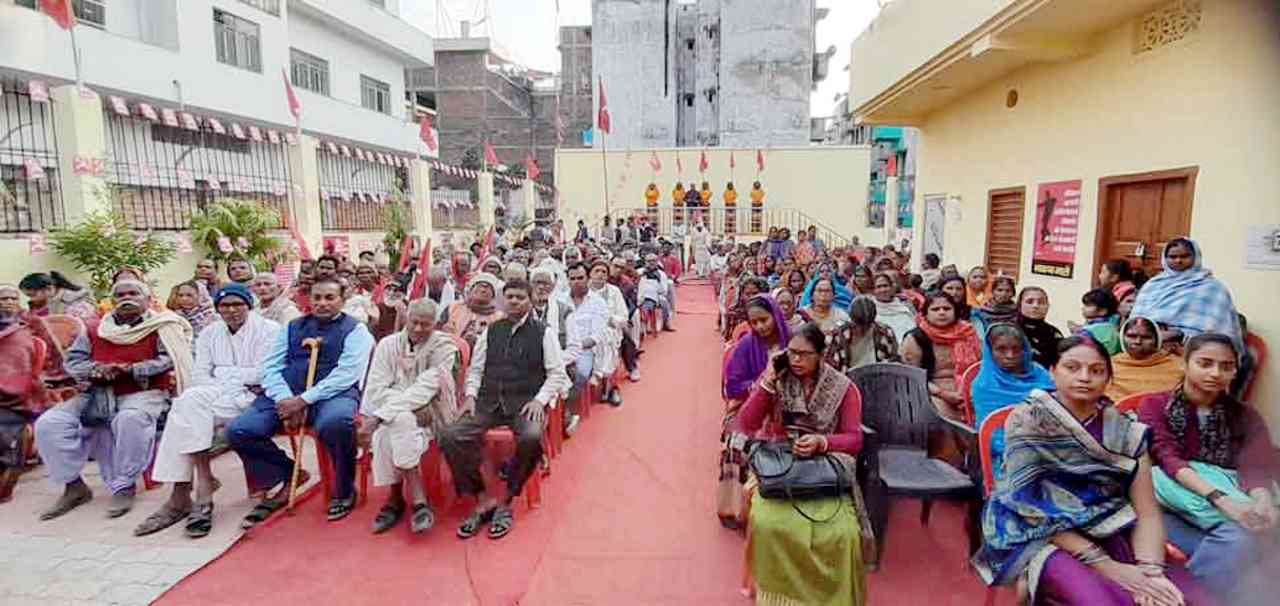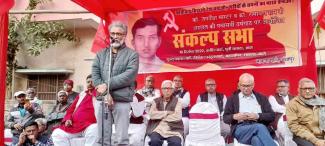On 10 December 2022, the 50th martyrdom day of the founder of CPIML in Bhojpur and the architect of the farmer's movement in Bhojpur, Com. Jagdish Master and Com. Ramayana Ram, was commemorated by CPIML. They were martyred on the same day in the year 1972 becoming the first martyrs of the Bhojpur movement.
The commemorative program began on 10 December at Master Saheb's village, Ekwari, which is considered the key point of the revolutionary movement in Bhojpur. CPIML General Secretary Com. Dipankar Bhattacharya, Bihar State Secretary Kunal, Polit Bureau member Amar, National General Secretary of All India Kisan Mahasabha Rajaram Singh, District Secretary Jawahar Singh and many senior leaders of the party reached Ekwari early in the morning. The event also saw participation by CPIML MLAs Sudama Prasad (Tarari), Manoj Manzil (Agiaon), Arun Singh (Karakat), Mahanand Singh (Arwal), Virendra Prasad Gupta (Sikta), Amarjit Kushwaha (Jirodai) and Rambali Singh Yadav (Ghoshi).
The party leaders and hundreds of party workers first paid tribute to Master Saheb by offering flowers at his memorial in Ekwari. This was followed by a Sankalp Sabha (meeting) addressed by Com. Dipankar. Master Saheb’s daughters (Usha and Asha) and other family members were present on the stage and interacted with the party leaders. The party leaders then visited Master Sahab's house and those places where the trio of Master Sahab, Ramnaresh Ram and Rameshwar Ahir used to hold meetings to strategise the course of the revolutionary movement.
From Ekwari, a procession began in the form of a convoy of motorcycles and cars. It travelled through Agiaon and Gadhani to reach Aayar, the village of Com. Ramayan Ram. The participants of the procession raised slogans remembering the Bhojpur martyrs and reaffirming their commitment to the movement for social change: Long live the warriors of social change; We will not tolerate attack on democracy-constitution, Down with fascism Shouting. The village of Aayar has been an important center of party work and the procession stopped at the village to pay homage at the memorial to Ramayana Ram. The next stop was Bihiya – it was in Bihiya market where Jagdish Master and Ramayana Ram were killed by the zamindars of Bhojpur. Ramayana Ram died while trying to save his beloved leader, Master Saheb.
The main program took place at Arrah's Kranti Park. AISA-RYA members and party workers led by Raju Yadav welcomed the convoy, and then proceeded to the Kranti Park in the form of a rally roaming the city of Arrah. Here, the gathering was joined by senior leader of CPIML, Com. Swadesh Bhattacharya. The meeting here (Sankalp Sabha) was addressed by Dipankar Bhattacharya and Rajaram Singh and Dilraj Pritam conducted the proceedings. A revolutionary song was presented by Nirmohi ji (poet), Raju Ranjan (Yuvaniti), Kalavati Devi (AIPWA), Chandrama Prasad and Gulabo Devi among others.
Comrade Dipankar recalled the long-standing legacy of the revolutionary struggles and martyrdoms that blazed in the farmlands of Bhojpur in the 1970s under the leadership of the weakest sections of the society fighting for their rights. And, he presented the current challenges in perspective. He pointed out that 10 December is the day of martyrdom of Master Jagdish and Ramayana Ram, as well as the International Human Rights Day. After defeating Hilter and fascism in Europe after World War II, the League of Nations prepared a Charter of Human Rights. This was because the people of the world realized that every human being should be ensure the basic rights (such as freedom, food, employment, liberty, free speech, education and health), colonialism and slavery must end. While an international declaration came into effect, there was little change in the conditions of the most oppressed in India, the poor-Dalits-tribals-women-working classes.
“That is when, here in Bhojpur, began the fight for equality, rights and justice for the laborers, under the leadership of Master Jagdish. Just as 1947 was the fight for freedom against British rule, in the 1970s, the movement of Bhojpur was to achieve social and economic freedom and equality. The spark of Naxalbari was ignited in Ekwari. The movement was strengthened by the many martyrs and on the basis of that the poor, deprived people of the village, landless farmers and women. Today, no one can say that Bhojpur is being ruled by feudal lords - Bhojpur has changed - it is the district where the poor, working class, farmers and the youth are the most organized and have the strength to move forward.
Taking inspiration from that era, we have to fight today's battle. Since 2014, a regime is running in the country, which is bent on crushing the country's constitution, democracy and all our rights achieved so far. The Prime Minister of the country says that In the coming days there will be only one party in the country and Amit Shah proclaims that the BJP shall rule not for 5 but for 50 years. At the same time, Ambani-Adani have been given a free hand to grab all the properties earned by our sweat and blood. It is the arrogance of the nexus of power and wealth that they dream of ruling the country for 50 years.
Amit Shah proudly talks about the massacre of Gujarat and their killing of Muslims as ‘permanent peace’. Bhojpur has also seen massacres like Bathani Tola - people here understand the pain of Gujarat violence of 2002 very well - what Gujarat suffered, Bhojpur also suffered. The BJP has the Gujarat model of the 2002 massacre and the Morbi bridge incident, while on the other hand there is the model of struggles in Bihar – we have created this model – in the 2020 elections, the people of Bihar almost ousted the BJP from power. Somehow the power was saved, but in the political environment of Bihar, it was made redundant. If this has been possible in Bihar, then the credit goes to the same tradition of martyrdom of Jagdish Master and Ramayana Ram, which is still present in Bihar.
There is a Grand Alliance government in Bihar now, but we fully stand with the people – the youth demanding employment, cooks demanding minimum honorarium, ASHA workers demanding government employee status, poor people facing bulldozers, demanding minimum wages, MNREGA workers, farmers demanding reinstatement of APMC Act. We believe that we must keep the flame of mass struggles alive to make the Government do its work. People do not rely on the government’s goodwill but on the strength of their own movements. Bihar does not stand on the strength of any government but on the strength of people’s movement. This is the only way it has moved forward.
That's why we have a big responsibility today; the whole country looks up to Bihar and Bhojpur for the same strength to draw upon the legacy of Jagdish Master, Ramayana Ram and all other martyrs to make our movements widespread and to fight BJP’s fascism. On the occasion of the 11th Party Congress on 15 February 2013 at Gandhi Maidan, Patna, we get together with the rallying cry of Save Democracy, Save the Country. Let this gathering of people be the historic step in the fight to save democracy, constitution and freedom. Come, let's make this rally historic, let’s come together to mobilise people to break all previous records and ensure the defeat of BJP in 2024 elections.”











